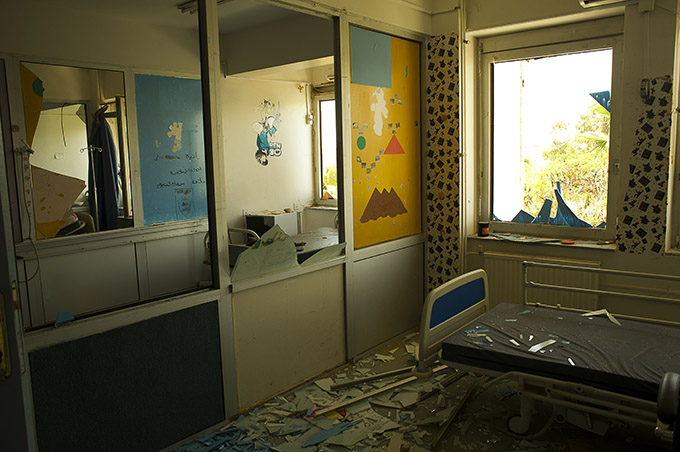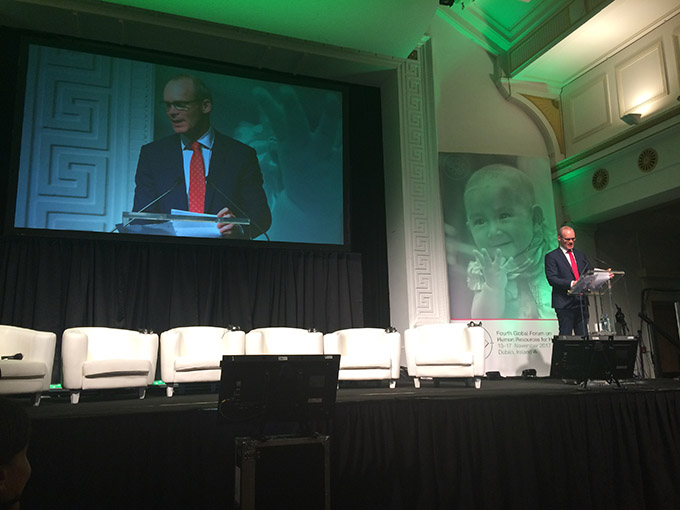Stories from the Global Forum on Human Resources for Health
22/11/17
Minister of State for the Diaspora and International Development, Ciarán Cannon, speaking at the opening session of the Global Forum on Human Resources for Health. Photo: WHO/2017
“Welcome to my world.”
These were some of the first haunting words uttered by the WHO’s Dr. Rudi Coninx, as he pointed to a picture of a city in ruin. The room was silent.
“In my world, hospitals are under attack.”

A room in the pediatric section of a hospital in Sirte, Libya damaged due to fighting. Photo: André LIOHN, ICRC/2016
This was only one account of the current aggression and violence toward health personnel in the session Health Care in Danger: How to Better Prepare and Protect Health Care Personnel at the Fourth Global Forum on Human Resources for Health. Accounts were also presented by Dr. Juan Garrote, General Council of Medical Colleges (Spain) and Dr. Lubyanka Baig, Jinnah Sindh Medical University (Karrachi, Pakistan). Each speaker presented different contexts on how health workers and the infrastructure were being targeted, and how health is ultimately impacted. There were examples of armed violence and attacks on health facilities in conflict zones, and the recent research on the violence and aggression against the health workforce in Spain and Karachi, Pakistan.
As a nursing professional, I was horrified at some of the accounts that I heard. Imagine going to work everyday and risking your life to save the lives of others. And yet, this is the daily reality of countless health workers around the world. In 2016, there were 302 attacks in 20 countries on health staff, health centers and ambulances. 62% were reported to be deliberate attacks on health facilities and personnel, with 561 injuries and 418 deaths (WHO 2017).

Minister Coveney speaking at the closing plenary session of the Global Forum on Human Resources for Health. Photo: WHO/2017
When health personnel and health centers are targeted, the entire health system suffers. A hospital is not rebuilt overnight when destroyed. A medical professional is not trained within a few weeks if they are injured, killed, or decide to leave the profession altogether due to constant harassment and risk of violence. Everybody feels the repercussions.
“These attacks rob citizens of desperately needed care.” Dr. Tedros Adhanom Ghebreyesus, WHO Director-General, is clear in his stance:
“Health workers must not be a target. Every attack on a health worker is a loss that ripples out to communities and through health systems. WHO stands ready to protect health workers so they can get on with their jobs and save lives.”
This is a very frightening truth. However, the world will not be silenced. The health workers and the infrastructure need to be protected. This is everybody’s business. The conversation has to continue. Research is central to further understand the phenomena, which inform policy and law makers on how to initiate change.
In his closing statement, Dr. Coninx issued a rallying call to all involved in international health to work together to address the issue of violence against health workers:
“This is a global issue. It is here to stay. We will have to work on it all together to make sure that the issue is being addressed. So, we count on the international community and also all the health professionals [and] all the health researchers to provide us with more evidence, so that we can make evidenced-based recommendations to the people who can make the difference.”
This article was written by Jennifer Trainor as part of the Irish Forum for Global Health's "Global Health Writes" initiative." Jennifer Trainor is a registered nurse from Montreal, Canada, with experience in neonatal and obstetrical nursing. She is currently pursuing a PhD in nursing and global health at Trinity College Dublin, Ireland, with a focus in maternal and child health. In her spare time, Jennifer enjoys SCUBA diving and horseback riding. Further articles can be found https://globalhealth.ie/category/global-health-writes-articles-2/

